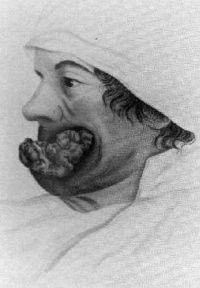Disease
From The Art and Popular Culture Encyclopedia
| Revision as of 07:22, 21 May 2015 Jahsonic (Talk | contribs) ← Previous diff |
Revision as of 07:26, 21 May 2015 Jahsonic (Talk | contribs) Next diff → |
||
| Line 1: | Line 1: | ||
| + | [[Image:Portrait of a Kleptomaniac or Portrait of an Insane Person (French L'Aliéné or Le Kleptomane) is a 1822 oil painting by Théodore Géricault.jpg|thumb|left||200px|''[[Portrait of a Kleptomaniac]]'' (1822) by [[Théodore Géricault]]]] | ||
| [[Image:Tumor by Alibert.jpg|thumb|200px|right|[[Tumor]] by [[Alibert]], [[1833]]]] | [[Image:Tumor by Alibert.jpg|thumb|200px|right|[[Tumor]] by [[Alibert]], [[1833]]]] | ||
| - | [[Image:Painting showing opisthotonos in a patient suffering from tetanus by Sir Charles Bell.jpg|thumb|right|200px|Painting showing [[spasm]]s in a patient suffering from tetanus by Sir [[Charles Bell]] ([[1809]]).]] | + | ([[1809]]).]] |
| {{Template}} | {{Template}} | ||
| Line 32: | Line 33: | ||
| == See == | == See == | ||
| *[[sick]] | *[[sick]] | ||
| + | *Painting showing [[spasm]]s in a patient suffering from tetanus by Sir [[Charles Bell]] | ||
| {{GFDL}} | {{GFDL}} | ||
Revision as of 07:26, 21 May 2015
(1809).]]
|
Related e |
|
Featured: |
A disease is an abnormal condition of an organism that impairs bodily functions. In human beings, "disease" is often used more broadly to refer to any condition that causes discomfort, dysfunction, distress, social problems, and/or death to the person afflicted, or similar problems for those in contact with the person. In this broader sense, it sometimes includes injuries, disabilities, disorders, syndromes, infections, isolated symptoms, deviant behaviors, and atypical variations of structure and function, while in other contexts and for other purposes these may be considered distinguishable categories. This article primarily describes human diseases, one of man's greatest enemies.
While many diseases are biological processes with observable alterations of organ function or structure, others primarily involve alterations of behavior.
Classifying a condition as a disease is a social act of valuation, and may change the social status of the person with the condition (the patient). Some conditions (known as culture-bound syndromes) are only recognized as diseases within a particular culture. Sometimes the categorizaton of a condition as a disease is controversial within the culture.
Disorder
- In medicine, a disorder is a functional abnormality or disturbance. Medical disorders can be categorized into mental disorders, physical disorders, genetic disorders, emotional and behavioral disorders, and functional disorders. The term disorder is often considered more value-neutral and less stigmatizing than the terms disease or illness, and therefore is a preferred terminology in some circumstances. In mental health, the term mental disorder is used as a way of acknowledging the complex interaction of biological, social, and psychological factors in psychiatric conditions. However, the term disorder is also used in many other areas of medicine, primarily to identify physical disorders that are not caused by infectious organisms, such as metabolic disorders.
See also
- Airborne disease, a disease that spreads through the air
- Contagious disease, a subset of infectious diseases
- Convalescence
- Cryptogenic disease, a disease whose cause is currently unknown
- Developmental disability, severe, lifelong disabilities attributable to mental and/or physical impairments
- Environmental disease
- Lifestyle disease, a disease caused largely by lifestyle choices
- List of acronyms on diseases and disorders
- List of cutaneous conditions
- List of human diseases associated with infectious pathogens
- List of mystery diseases
- Lists of diseases
- Non-communicable disease, a disease that can't be spread between people
- Plant pathology
- Rare disease, a disease that affects very few people
- Sociology of health and illness
- Wellness (alternative medicine), a healthy balance of the mind-body and spirit that results in an overall feeling of well-being.
See
- sick
- Painting showing spasms in a patient suffering from tetanus by Sir Charles Bell
_is_a_1822_oil_painting_by_Théodore_Géricault.jpg)


